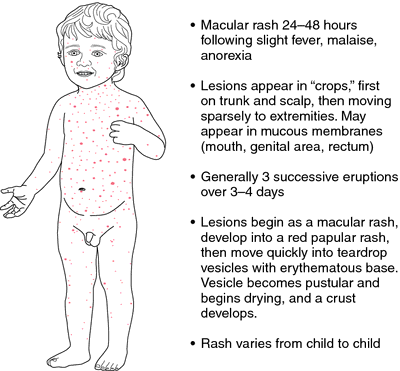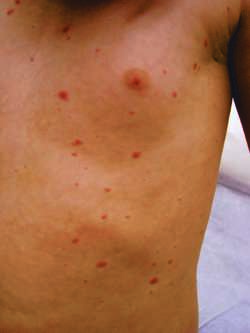Medical term:
varicelloid
chickenpox
[chik´en-poks]The vesicles do not appear all at once, but in crops, the number of crops depending on the severity of the case. Usually the eruptions are concentrated on the back and chest, with only a few appearing on the arms, legs, and face, but in severe cases they may cover almost all of the body.

Most cases of chickenpox are mild and require no special treatment except rest in bed and forcing fluids during the fever stage. For severe itching, emollient baths, calamine lotion, or other applications offer some relief. Since scratching the scabs may result in permanent scars and opens the way for other infections, the child's fingernails should be cut short and the hands washed often.
The Centers for Disease Control and Prevention recommends airborne and contact isolation. Other recommendations include after-exposure advisories. Varicella-zoster immune globulin (VZIG) should be used when appropriate, along with discharge of susceptible patients if possible. Exposed susceptible patients should be placed on airborne precautions beginning 10 days after exposure and continuing until 21 days after the last exposure (up to 28 days if VZIG has been given). Susceptible persons should not enter the room of patients on precautions if other immune caregivers are available. (See Atlas 2, part M.)
var·i·cel·la
(var'i-sel'ă),See also: herpes zoster.
varicella
(văr′ĭ-sĕl′ə)Complications Otitis, pneumonia, 2º bacterial rashes and infections, encephalitis—5–15% mortality, 15% with permanent neurologic sequelae— ataxia, palsies, Reye syndrome, a potentially fatal complication, viral pneumonia—1:400 require hospitalization—thrombocytopenia, purpura fulminans, myocarditis, glomerulonephritis, hepatitis, myositis; after resolution of clinical disease, HHV-3 becomes latent, integrating its DNA into the dorsal root ganglion cells
Management Acyclovir may shorten duration of disease
varicella
Chickenpox, see there.var·i·cel·la
(var'i-sel'ă)Synonym(s): chickenpox.
varicella
(var?i-sel'a) [L., a tiny spot]
Symptoms
After an incubation period of 2 to 3 weeks (usually 13 to 17 days), patients develop fever, malaise, anorexia, and lymphadenopathy, followed by the appearance of an extremely pruritic (itchy) rash that starts flat and, over time, becomes a small blister on a red base, and then eventually forms crusted scabs. All three stages of the rash may be present on the body at one time. Varicella may be transmitted to others until all lesions are crusted over.
Occasionally, for example, when it occurs in adults or immunosuppressed children, chickenpox is complicated by superimposed bacterial pneumonia, encephalitis, or thrombocytopenia. Immunization with varicella vaccine provided during infancy is designed to prevent these complications.
Etiology
Chickenpox may strike individuals of any age who have not been previously been exposed to the virus. Epidemics are most frequent in winter and spring in temperate climates.
Differential Diagnosis
Impetigo, dermatitis herpetiformis, herpes zoster, and furunculosis may occasionally need to be distinguished from varicella, although usually the difference is obvious.
Complications
Secondary infections may occur, caused by scratching, which may result in abscess formation; at times, development of erysipelas or even septicemia may result. Occasionally, lesions in the vicinity of the larynx may cause edema of the glottis and threaten the life of the patient. Encephalitis is a rare complication. Varicella may be fatal in children with leukemia or children who are taking adrenocorticosteroids.
Prevention
Administration of varicella-zoster immune globulin (VZIg) within 72 hr of exposure will prevent clinical varicella in susceptible, healthy children. The following conditions should alert one to the possible need for use of VZIg: immunocompromised children; newborns of mothers who develop varicella in the period 5 days before to 48 hr after delivery; postnatal exposure of newborns (esp. those who are premature) to varicella; healthy adults who are susceptible to varicella and who have been exposed; pregnant women who have no history of having had varicella and who have had significant exposure. The use of VZIg in pregnant women will not prevent fetal infection or congenital varicella syndrome. Live attenuated vaccine is now available for general use.
CAUTION!
Because severe illness and death have resulted from varicella in children being treated with corticosteroids, these children should avoid exposure to varicella.Treatment
Otherwise healthy affected children are treated with diphenhydramine or hydroxyzine to reduce itch and acetaminophen to reduce fever. Children at increased risk for complications and immunosuppressed adults are given varicella-zoster immune globulin as prophylaxis after exposure. If varicella infection develops in immunosuppressed persons or pregnant women in the third trimester, intravenous acyclovir is administered. Immunization with varicella vaccination is recommended for those children who have not had chickenpox and have not previously received the immunization.
varicella gangrenosa
varicella
Chickenpo: a usually trivial infectious disease of childhood caused by the varicella-zoster virus which also causes SHINGLES in adults. There is a rash of tiny, flat, red spots which quickly become small blisters (vesicles), turn milky, dry to crusts and then scab off. Varicella in immunocompromised people can be serious, with as many as 1000 lesions, secondary infection, and severe general upset. It may occasionally be fatal in such cases. Varicella can be prevented by vaccination.Varicella
var·i·cel·la
(var'i-sel'ă)Synonym(s): chickenpox.
Patient discussion about varicella
Q. How contagious is chicken pox? I just found out that a kid in my son's preschool has chicken pox. What are the chances my son got it too? He hasn't been vaccinated against it. He is 3 years old.
before you would like to go on with any vaccination, you should check out this very long list of links:
http://www.aegis.ch/neu/links.html
at the bottom you will also find links in english. vaccinations in general are very disputable/dubious and it is probably time that we learn about it.
Q. Is chicken pox dangerous to my fetus? I am pregnant and have never had chicken pox before. My daughter is 2 years old and has not had chicken pox before and hasn't been vaccinated against it either. If she does catch chicken pox can this be dangerous to me or the fetus?
i advice you also to inform yourself and build your own opinion with this link-page:
before you would like to go on with any vaccination, you should check out this very long list of links:
http://www.aegis.ch/neu/links.html
at the bottom you will also find links in english. vaccinations in general are very disputable/dubious and it is probably time that we learn about it.
Latest Searches:
Voraxaze - Voranil - Voorhoeve - voodoo - VOO - Vontrol - von - vomitus - vomiturition - vomitory - vomitoria - vomito - vomitive - vomiting - vomit - vomica - vomerovaginalis - vomerovaginal - vomerorostralis - vomerorostral -
- Service manuals - MBI Corp